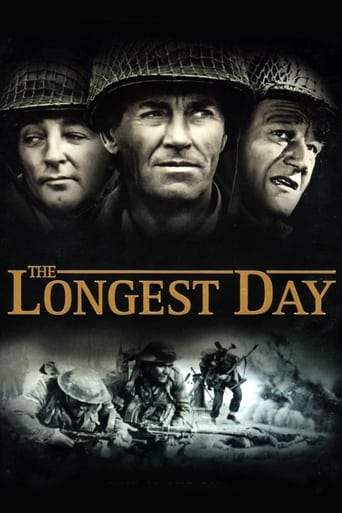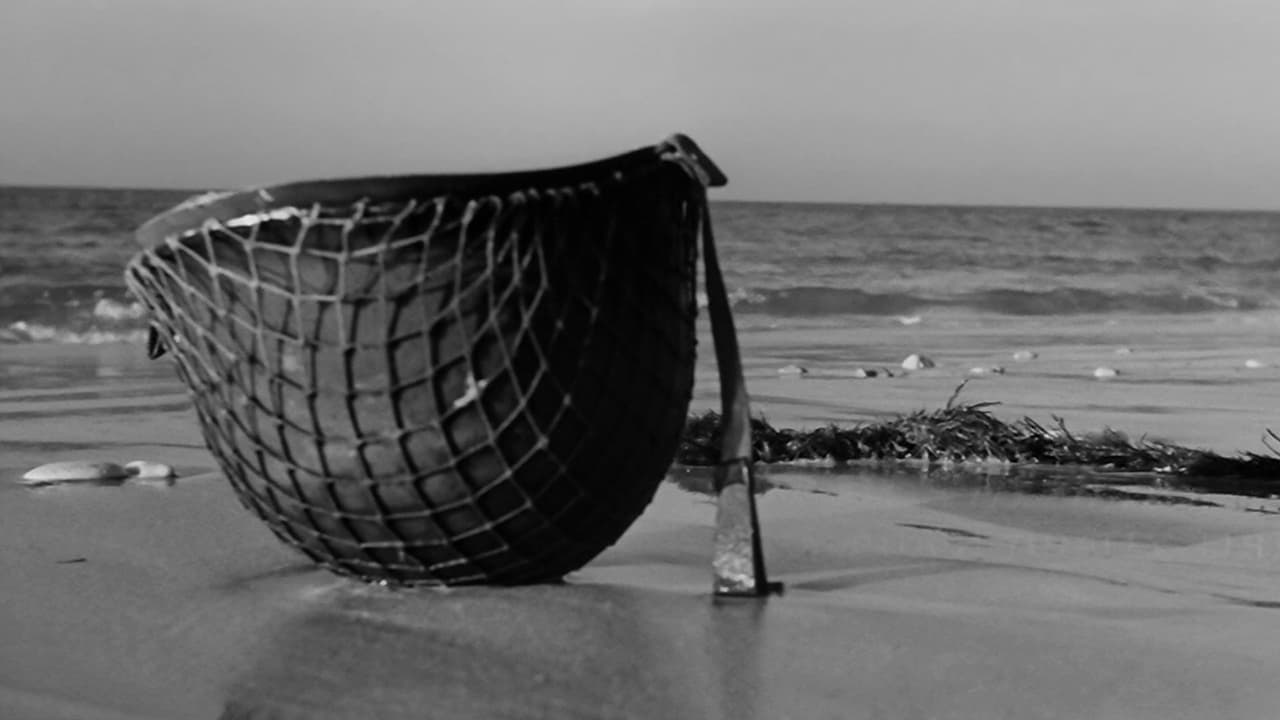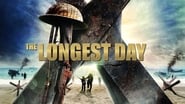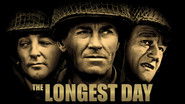JohnHowardReid
Copyright 4 October 1962 by Darryl F. Zanuck Productions. Released through 20th Century-Fox Film Corp. New York opening at the Warner Theater: 4 October 1962. U.S. release: 4 October 1962. U.K. release: 20 October 1963 (sic). 16,200 feet. 180 minutes.SYNOPSIS: D-Day, 6 June 1944.NOTES: Negative cost: $10.2 million, making it the most expensive black-and-white movie ever made by a commercial film studio. With an initial domestic rentals gross of $17.6 million, "The Longest Day" was second only to Fox's own "Cleopatra" at the U.S./Canadian box-office for 1963. Although it was not generally released in the U.K. until late October 1963, "The Longest Day" took more money at U.K. ticket- windows than any other movies in 1963 except "Cleopatra", "How the West Was Won" and "Lawrence of Arabia". Oddly, though the movie was well-liked, it did absolutely nothing like this sort of business in Australia. In fact, receipts barely covered the cost of a massive advertising blitz.Won two prestigious Hollywood awards: Best Black-and white Cinematography. (Through some indefensible miscarriage of justice, the award was given only to Bourgoin and Wottitz). And Best Special Effects, defeating "Mutiny on the Bounty". (Only Robert MacDonald and sound mixer Jacques Maumont shared the award. The official reason for this is that by Special Effects, the Academy means only Special Visual, namely Photographic Effects and Sound Effects. Dissolves, super-impositions, mattes, glass shots, irises, double exposures, process screen work and the like are all covered, but not necessarily miniatures, tank shots and definitely not explosions, stunts and choreographed action sequences. In actual practice, however, the lines of demarcation are somewhat blurred. Many Hollywood studios including M-G-M made a practice of nominating all the heads of their special effects departments, including miniatures. Other studios like Fox, RKO and Paramount included only camera personnel. So whether you received one of those prestigious Hollywood awards for your miniatures and painted backgrounds depended to some extent at which studio you worked at).Also nominated for prestigious Hollywood awards for Best Picture (won by "Lawrence of Arabia"); Black-and-white Art Direction (won by "To Kill a Mockingbird"); Film Editing (won by "Lawrence of Arabia").Best English-language Movie Release of 1962 — National Board of Review. 4th Best Motion Picture of 1962 — Film Daily poll of American film critics. Best Screenplay — The Film Daily. Best Direction — The Film Daily. Best Photography — The Film Daily. Tied with Lawrence of Arabia for Best Film of 1962 — The New York Daily Mirror. Number 2 on the N.Y. Daily News list and also on the Filmfacts composite list.COMMENT: Although not listed at all in the official credits, Gerd Oswald directed some of the most effective episodes, including the searingly unforgettable sequence with Red Buttons. Zanuck himself directed the interior ship-board, plane-board and barracks-board scenes, while Elmo Williams handled most of the battle footage, and Wicki did a lot of memorable German work including of course that stunning D-Day bombardment scene with Hans Christian Blech. Though the story structure is necessarily episodic, the film retains our firm interest, partly because of the inventiveness of the writing, particularly its sharply realistic dialogue and colorful characterization; partly because of the movie's spectacular scope and breadth, plus all the stunningly-staged action; and partly because of the constant star-spotting. So far as actual acting goes, I thought the German players creamed the rest. Wayne and Mitchum are wholly their usual selves, but it's good to see Richard Todd in uniform again. Burton, however, is moodily dull, even with Donald Houston along to stooge him his cues.OTHER VIEWS: The producer's actual battlefield experience is amply reflected in all phases of The Longest Day, for never before had Zanuck been so intimately involved in the making of any of his pictures. He worked with the writers, Ryan, James Jones and Romain Gary; spent long night hours planning camera angles and positions; talked "strategy" with the army and the navy; conferred with directors, sound men, special effects technicians, prop men and accountants. Even so, he was present, day after day, in good weather and foul. - Fox publicity.
Ross622
This movie is one of the finest war movies that I've ever seen and unlike most movies that i've seen about the D-Day invasion this one goes into much more detail despite some inaccuracies that frustrated the real people even General Eisenhower walked out of this movie when it was being shown in theaters due to inaccuracies. Operation Overlord is frequently associated with Eisenhower as he was the architect of the invasion and during that time he sent fake intelligence to the Germans to trick them about the invasion. The movie also talks about the American soldiers behind the scenes such as Col. Benjamin Vandervoort (John Wayne), Brig. Gen. Norman Cota (Robert Mitchum), Brig. Gen. James m. Gavin (Robert Ryan), Col. Thompson (Eddie Albert), as well as the son of Theodore Roosevelt (Henry Fonda) who was a Brigadier General. The film also tells its story from the British and German perspective with precision and marvelous detail and perfectionism thanks to the direction by Ken Annakin, Andrew Marton, and Berhnard Wicki who directed one of each of the episodes of this movie on such an excellent level. The performances are also excellent and impressive with actors from different parts of the world, and an excellent supporting cast including Richard Burton as British flying officer David Campbell, and along with Mitchum, Fonda, Ryan, and Albert, there is also people like Red Buttons, Roddy McDowall, Jeffery Hunter, Paul Anka, and especially a young Sean Connery who doesn't have that many scenes but makes it count with the amount of screen time he has. Feature films aren't known for accuracy when they're telling real life stories but documentaries are the only ones that are which doesn't bring this movie down one bit. The writing is superb, the performances are top notch,and every person involved made it into a masterpiece that ranks among the best military movies ever made such as "Saving Private Ryan" (1998), "The Great Escape" (1963), "Platoon" (1986), "The Deer Hunter" (1978), "Where Eagles Dare" (1968), as well as many others. This is an essential movie that is required viewing for history students who are studying World War II in their respective classes, and it is one of the most patriotic movies i've ever seen, as well as being one of 1962's finest films.
jacobs-greenwood
The epic story of D-Day, June 6, 1944, a retelling of the Normandy invasion (France) by the Allies (e.g. troops from the United States and Great Britain, among others) during World War II from across the English Channel, detailing various assaults and the American, British, French, and German perspectives (e.g. the Nazi thinking that Calais would be invaded).This essential war drama was directed by Ken Annakin, Andrew Marton, and Bernhard Wicki; it features a screenplay by Cornelius Ryan that was based on writing by Romain Gary, James Jones, David Pursall, and Jack Seddon. The film was nominated for a Best Picture Oscar, it won Academy Awards for its B&W Cinematography and Special Effects; it also received Oscar nominations for its B&W Art Direction-Set Decoration and Samuel Beetley's Editing (his first).The first hour of the film is the set-up and background information (e.g. the Allies waiting, trying to decide whether to go during imperfect weather conditions while the Germans try to guess if and where the invasion will take place), the second details the overnight clandestine activities (including a diversion using miniature dummy paratroopers that explode upon landing, dubbed Rupert), and the third begins with the various beach assaults.The all-star cast includes (among others), alphabetically:Eddie Albert as Colonel Thompson (whose troops are pinned down on Omaha Beach), Paul Anka and Fabian as U.S. Army Rangers, Richard Beymer (who wins a lot of money gambling, receives a "Dear John" envelope containing beads, and ends up asking "I wonder who won" in the end while with), Richard Burton as Flight Officer David Campbell (whose leg gets injured), Red Buttons as Private John Steele (a paratrooper whose parachute gets snagged on a church with bells), Sean Connery as Pvt. Flanagan (who comments on the Britisher's use of bagpipes), Mel Ferrer as Major General Robert Haines (a behind- the-lines officer who tracks the progress or lack thereof), Henry Fonda as Brigadier General Theodore Roosevelt Jr. (who, despite his pedigree and arthritis that requires him to use a cane, goes ashore with his men, though a couple of miles too far North), Steve Forrest as Captain Harding (a paratrooper officer in John Wayne's unit), Gert Fröbe as Sergeant Kaffekanne, Jeffrey Hunter as Sergeant John H. Fuller, Curt Jürgens as Major General Gunther Blumentritt (who's frustrated that Adolf Hitler's aide won't wake him to allow Panzer tanks in reserve to move up), Peter Lawford as Lord Lovat (the British secret service commander whose unit must relieve glider units that took a bridge during the night), Roddy McDowall as Pvt. Morris (who went ashore an infantry man on a landing vehicle and took out an enemy machine-gunner), Sal Mineo as Pvt. Martini (a paratrooper who misreads a clicker signal), Robert Mitchum as Brig. Gen. Norman Cota (whose efforts and inspiration finally enabled a breakthrough at Omaha Beach), Kenneth More as Capt. Colin Maud, Edmond O'Brien as Gen. Raymond D. Barton (who hesitates sending Roosevelt Jr. ashore), Robert Ryan as Brig. Gen. James M. Gavin (who gives John Wayne's unit a challenging mission), Tommy Sands and George Segal as U.S. Army Rangers, Rod Steiger as a Destroyer Commander (who appears very briefly, saying a few patriotic words), Richard Todd as Maj. John Howard, Tom Tryon as Lieutenant Wilson, Peter Van Eyck as Lt. Col. Ocker, Robert Wagner as a U.S. Army Ranger (whose unit much climb a fortified cliff in order to knock out a fortified artillery bunker), Stuart Whitman as Lt. Sheen (also a paratrooper under Wayne's command), and John Wayne as Lt. Col. Benjamin Vandervoort (the paratrooper's commander who shatters his leg upon landing and commandeers a wagon for transportation).
Edgar Allan Pooh
" . . . because our glorious Fuehrer has taken a sleeping pill and is not to be awakened," laments a German field marshal around dawn on THE LONGEST DAY. With its peppy theme song desecrated by sappy, upbeat lyrics, this farce is no BRIDGE ON THE RIVER KWAI. The soldiers there had the sense to merely whistle "Colonel Bogie's March," NOT prattle insipid lyrics glossing over unspeakable war-time agonies. Most of the spoken dialogue in THE LONGEST DAY sounds so contrived, pompous, and written 15 years after-the-fact that it seems probable that some of the dimmer bulbs in the cast--such as self-admitted potheads John Wayne and Robert Mitchum--were allowed to ad lib their own lines. With at least 60 speaking parts, most characters (including Henry Fonda's doomed American President's son) get lost in the shuffle, and virtually none merit a movie watcher's attention (no matter how Heroic their Real Life counterparts). If Hitler had had an opportunity to watch this three-hour snooze-fest, he would not have needed to take a sleeping pill in order to nod off! Producer Darryl F. Zanuck apparently was too dense to realize that having FIVE directors on your flick is nothing to crow about. If he wanted to be honest about something, he might have advertised that THE LONGEST DAY was mostly his effort to make his latest mistress--Irina Demich--a movie star, so that he could reap the perks that might come with her gratitude. THE LONGEST DAY is like giving SAVING PRIVATE RYAN a HOGAN'S HEROES makeover. This could well be one of the WORST World War Two pictures of all time!



 AD
AD






